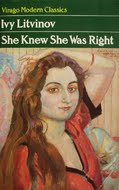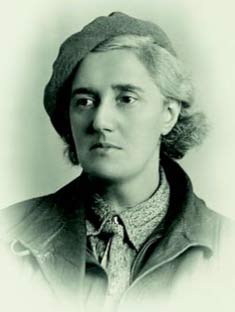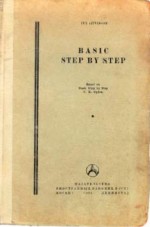A post for Women’s History Month
A few weeks ago whilst preparing for my final-year undergraduate Dostoevsky class I plucked an old translation from my shelf that I’d bought a couple of years previously at the Amnesty shop in Shoreditch boxpark. I’d barely looked at it before – I tend to collect old Dostoevsky translations more out of habit than anything else – but I was very surprised when I opened it to see that it was translated by Ivy Litvinov, the British wife of the Soviet diplomat. Beyond the facts that Maxim Litvinov had lived in London prior to the revolution and had acquired a wife in the process – which had registered during research Lenin for my Russians in London project – I knew nothing at all about Ivy Litvinov, so I was intrigued, and sat down to read her translation of ‘Skvernyi anekdot’. It has the title ‘Most Unfortunate’, which didn’t convince me at first, although the more I think about it, the more it seems like a suitably idiomatic English expression that reflects not so much the period when she was translating (the 1950s), but, as is so often the case with expats, her previous life in Britain, which she had left in the early twenties, with only irregular visits thereafter.
The translation itself really impressed me, which is not something one can often say about that era; of those published in Britain, David Magarshak’s translations for Penguin are remarkable mainly for making Dostoevsky, Gogol, Goncharov and Chekhov sound exactly the same, while those produced by the various foreign language presses in the Soviet Union at the time are generally even worse, ranging from the merely laboured to the grossly inaccurate. Litvinov, on the other hand, captures the verbose pomposity and humour of Dostoevsky’s narrative in a rather stylish and readable manner.
I started to scan my shelves and discovered this was not the only translation by Ivy Litvinov I owned – I also had some Chekhov, and Alexei Tolstoi’s three-volume Ordeal – the latter given to me as a joke by a friend when I decided to study Russian at university. A quick search of the SSEES library catalogue, Amazon and Abe Books revealed several more, as well as some of her original works, and as no such thing is available elsewhere, I have compiled a list which I hope will encourage people to seek out her work. I’d be grateful for any additions or corrections. There are certainly a few short works published in Russian that I haven’t yet managed to track down.
There are a couple of websites that give some details of Ivy Litvinov’s life (the best comes from a family member, while there are a few interesting details here), but the best source is undoubtedly the affectionate but clear-sighted biography by John Carswell, The Exile: A Life of Ivy Litvinov (Faber, 1983). I don’t therefore intend to present her biography in enormous detail here, but will just give the outlines.
She was born Ivy Therese Low on 4 June 1889. Her parents were Walter Low, the son of a Jewish immigrant from central Europe, and Alice Baker, the daughter of an officer in the Indian army. Walter died when Ivy was only five years old, and her mother remarried a medieval scholar who worked at the British library and eventually became Assistant Keeper of books. After a fairly unhappy childhood – the present step-father as despised as much as the absent father was adored – in which Ivy drifted towards more intellectually broad-minded relatives, she ended up working at the Prudential offices in Holborn, and began her writing career. Her first novel, Growing Pains (Heinemann, 1913), published at the age of 23, exhibited the autobiographical streak that is apparent in much of her best writing, and the same is true of her second (rather racy) novel, The Questing Beast, which, according to Carswell (p. 72), is one of the first novels to depict women in office life. The first book is difficult to get hold of now, but the second has been published as an ebook.
It was through her relatives in 1916 that she met Maxim Litvinov, who was then living in London, as many of the Bolshevik revolutionaries did at one point or another (see my post on Lenin in London). The story of their courtship and marriage is given fictional treatment in her rather wonderful 1969 short story ‘Call it Love’ – a highly evocative depiction of London in that era as well as of the tentative romance between two strangely unmatched people from very different backgrounds. The story ‘Early Days’ (1973) gives a more straightforwardly autobiographical account of the same events (Carswell, p. 81). Maxim Litvinov stayed in London after the revolution as a quasi-diplomat – holding meetings on benches in St James’s park – but was arrested in September 1918 in retaliation for the arrest in Moscow of Bruce Lockhart, and after 6 weeks in Brixton prison was exchanged for the the British agent. Ivy stayed in London with their two children, Misha (later the father of the dissident Pavel Litvinov) and Tania (who later became a renowned English to Russian translator, as well as collaborating with her mother on many Russian to English translations).
The family was reunited in Moscow in 1922, and although there were trips abroad, mainly to Europe but also accompanying her husband to Washington DC when he was made Soviet ambassador during the war, Ivy remained in the Soviet Union for more or less the next fifty years, despite never converting to the cause politically. Her relationship with Maxim was rather bumpy. There were numerous affairs, mainly Ivy’s, who was clearly fairly adventurous; for example, Carswell (p. 119) quotes a letter with pretty frank description of an orgy with a lover and his friends in Hamburg in 1928. There were also periods of separation from her husband, including a stint in self-imposed exile in Sverdlovsk in the late thirties when the purges were at their height and things were looking most dangerous for Maxim. But whatever else was going on, there was clearly a lasting loyalty there, and they remained a couple throughout.
Although she had produced a few short pieces, Ivy made a more serious attempt to resurrect her writing career later in the twenties and even underwent hypnotism to help her. The eventual result, published by Heinemann in 1930 under her maiden name, was His Master’s Voice (later published in the States as A Moscow Mystery), a somewhat Agatha Christie-ish murder story set in the shadow of the Kremlin. I’m reading this at the moment and have to say that while I’m enjoying the local colour (which her British publishers saw as unmarketable at the time), I don’t think it’s as accomplished as her later short stories. Writing mystery novels certainly didn’t become a habit, and in the thirties Ivy became more involved with English language pedagogy, producing several text books, readers and dictionaries, and promoting C. K. Ogden’s Basic English programme.
It was after Maxim’s death in 1951 that Ivy turned to translation, and during that decade she kept up a phenomenal work rate, translating, either on her own or with her daughter Tatiana, around 25 novels and collections of stories, plus a couple of critical works. And to judge from the ones I have read so far, they are worth seeking out – Carswell makes very little of her translation work in the biography, but in fact I think this is one of her most significant contributions. In the sixties she also began to write short stories again – some fictional and some as part of her ‘sorterbiography’ (rather more interesting in terms of their form than the straightforward memoirs many people probably wish she had written) – which were published mainly in the New Yorker from 1966.
In 1960 she made her first extended visit to Britain for many years, but returned to the Soviet Union because of her family. However, in 1972 she returned to Britain permanently, living in Hove, actually, until her death in 1977. By this stage part of her family was already in the west, including her granddaughter Vera and her husband Valery Chalidze (whose 1977 book Criminal Russia has proved very useful to my research recently) and, later, Pavel Litvinov and his wife and children. Tatiana – ironically entitled to a British passport because of her father’s lack of official diplomatic status when she was born (Carswell, p. 200) – eventually came to join her mother in 1976.
I recommend the stories Ivy Litvinov published in the sixties and seventies, and strongly disagree with the verdict of Samuel Lipman who, in an extended review of Carswell’s biography, dismisses them as ‘a stale rehash of old memories of an England now forgotten or a retelling of scene from Russian life better done by native practitioners’ (Music and More: Essays, 1975-1991, Northwestern University Press, 1992, p. 276). Certainly in the British-set stories, there is a sense of a life that had disappeared by the time of writing, but for stories set in that period, as in the case of ‘Call it Love’, it is entirely appropriate. In the case of the Russian tales, I think she does have a new and different perspective.
 Probably because of my main research interest, what has really struck me about some of these stories is the persistent presence of the Gulag. This gives her depictions of often very mundane situations a traumatic underpinning that occasionally reminds me of the later short stories of Vasily Grossman. At times this has a really unsettling effect, as in the story ‘Apartheid’ (1970), in which a bourgeois couple rent a dacha for the summer and initially try to keep their children away from the ‘potentially undesirable’ granddaughter of their landlady who lives round the back, and who is equally reluctant to let the children mix. But they play together anyway, so attempts to separate them are abandoned. However, once they have invited the little girl, Milochka, into their dacha, the parents are horrified when she starts prattling on about Magadan, and they realize her mother must be in a labour camp in Kolyma. An uncanny effect is created by the jarring discrepancy between Milochka’s positive references (‘In Magadan we had cream with our kasha…’) and what the parents and readers know. This sense is intensified by Milochka’s gradual appropriation of all her playmates’ toys and their habit of parroting her explanations (”Milochka says…’), so that this small child becomes a very sinister figure, who infiltrates their family through her ideological domination of the children, and forces the adults to contemplate aspects of life they wish to ignore.
Probably because of my main research interest, what has really struck me about some of these stories is the persistent presence of the Gulag. This gives her depictions of often very mundane situations a traumatic underpinning that occasionally reminds me of the later short stories of Vasily Grossman. At times this has a really unsettling effect, as in the story ‘Apartheid’ (1970), in which a bourgeois couple rent a dacha for the summer and initially try to keep their children away from the ‘potentially undesirable’ granddaughter of their landlady who lives round the back, and who is equally reluctant to let the children mix. But they play together anyway, so attempts to separate them are abandoned. However, once they have invited the little girl, Milochka, into their dacha, the parents are horrified when she starts prattling on about Magadan, and they realize her mother must be in a labour camp in Kolyma. An uncanny effect is created by the jarring discrepancy between Milochka’s positive references (‘In Magadan we had cream with our kasha…’) and what the parents and readers know. This sense is intensified by Milochka’s gradual appropriation of all her playmates’ toys and their habit of parroting her explanations (”Milochka says…’), so that this small child becomes a very sinister figure, who infiltrates their family through her ideological domination of the children, and forces the adults to contemplate aspects of life they wish to ignore.
‘Pussy Cat, Pussy Cat, Where Have You Been?’ is not as successful, but this curious tale which submerges the story of a camp survivor within an animal fable contains a similar theme. It reminded me of one of the subjects in Jehanne Gheith’s oral history work with Gulag survivors – a former prisoner who named his dog Stalin and, by caring for it on a daily basis, went through a process of ‘non-narrative healing or repair’ (J. M. Gheith, ‘”I never talked”: enforced silence, non-narrative memory and the Gulag’, Mortality 12.2 (2007), p. 171). In Litvinov’s story, the cat, acting as the one point of continuity between the past and the present, represents both a comfort and the threat of exposure, which for me exemplifies the ambivalence of the Soviet experience.
There are other stories that address the Gulag theme, such as ‘Bright Shores’, and I may write about those at a later date. I am persuaded that Ivy Litvinov is worth reading as a writer and as a translator. I hope this post will encourage others to read her and contribute to her emergence from the obscurity she has never entirely managed to escape.



Barbara Burkhardt
/ June 7, 2017Thank you for this. I came upon it doing research in The New Yorker, when I discovered the story “Apartheid.” I appreciate your insights.
Miroslav
/ November 4, 2020You mention that the Soviet foreign publishing house translations were worse than Garnett’s. It’s worth pointing out though that the translation of Chekhov’s short stories was prepared by none other than Ivy Litvinov herself.
Sarah Young
/ August 9, 2021Indeed – my comment on the translations published by Progress etc was a generalization. Some were good, including Ivy Litvinov’s (I like her Dostoevsky translations in particular), but the general quality was not great.
Miroslav
/ August 9, 2021With all due respect I don’t entirely agree.
The translation quality was mixed to be sure but there were more than a few excellent translators at the Soviet publishing houses.
Julius Katzer, Christopher English, Robert Daglish in particular were pretty great. The only issue is when editors would sometimes correct translations thinking they were more accurate to the original Russian than the translator would make them out to be, overestimating their own English mastery. But yes, there were quite a few great translators at PP and i quite love the translations of Dosotoevsky, Chekhov, Gogol and Sholokhov that I read through PP. looking back on them fondly.